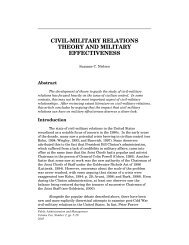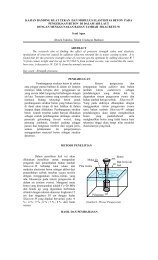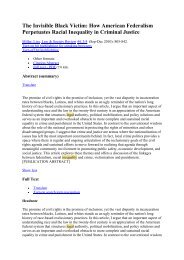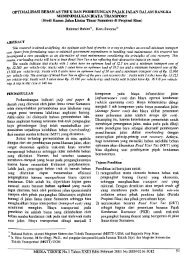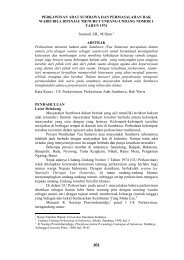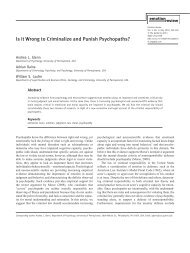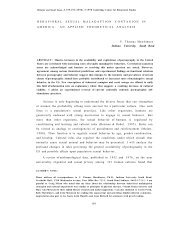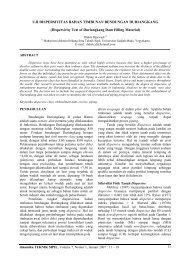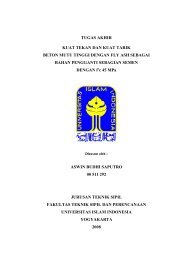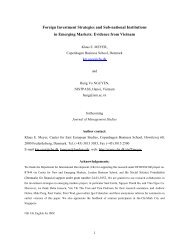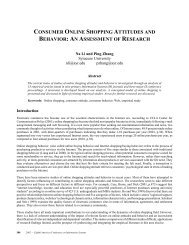Beyond the Qualitative Interview: Data Preparation and ... - E-Journal
Beyond the Qualitative Interview: Data Preparation and ... - E-Journal
Beyond the Qualitative Interview: Data Preparation and ... - E-Journal
You also want an ePaper? Increase the reach of your titles
YUMPU automatically turns print PDFs into web optimized ePapers that Google loves.
McLellan et al. / DATA PREPARATION 71<br />
<strong>the</strong>se instances, a researcher must determine if <strong>the</strong> inclusion of such information<br />
can result in personal or social harm, compromise <strong>the</strong> identity of <strong>the</strong><br />
interviewee, or o<strong>the</strong>rwise breach confidentiality (Morse 1994:232; Punch<br />
1994:94). A systematic convention for h<strong>and</strong>ling this type of information<br />
needs to be addressed in <strong>the</strong> transcription guidelines. In some instances, a<br />
researcher may opt to replace <strong>the</strong> real names of individuals, organizations, or<br />
settings with aliases. In o<strong>the</strong>r instances, a researcher may rely on substitution<br />
words or phrases that help retain contextual <strong>and</strong> referential information. For<br />
example, in our protocol, ra<strong>the</strong>r than including “John Doe, a community<br />
advocacy leader for <strong>the</strong> Atlanta HIV/AIDS initiative,” <strong>the</strong> substitution<br />
phrase “name of local AIDS community activist leader omitted” would be<br />
used. The substitution phrase would <strong>the</strong>n permit a researcher to retain important<br />
information while protecting <strong>the</strong> identity of an individual, group, community,<br />
organization, or locale.<br />
In o<strong>the</strong>r instances, a researcher may decide that <strong>the</strong> information is highly<br />
sensitive <strong>and</strong> that <strong>the</strong> only ethical choice is to completely remove this information.<br />
A decision regarding <strong>the</strong> omission of this type of information should<br />
be made before any transcription is undertaken. A researcher can opt to<br />
replace <strong>the</strong> highly sensitive information with a statement such as “sensitive<br />
information removed” or leave it out entirely. Sometimes, this decision is<br />
taken out of <strong>the</strong> researcher’s h<strong>and</strong>s by <strong>the</strong> funding agency or institutional<br />
review board (IRB) approving <strong>the</strong> research. Unless certificates of<br />
confidentiality 1 are obtained, it may not be enough to omit highly sensitive<br />
information from a transcript. The destruction of audiotapes after a specified<br />
time may be warranted. Research funding sources, IRBs, <strong>and</strong> research centers,<br />
however, may require that all data, including audiotapes, be stored for a<br />
substantial amount of time.<br />
A Note on Computer-Assisted Analysis<br />
If systematic data analysis is undertaken, <strong>the</strong> st<strong>and</strong>ardization of transcripts<br />
within a research project is crucial. Computers have certainly played a<br />
significant role in supporting systematic data analysis; however, we feel that<br />
<strong>the</strong> manual management <strong>and</strong> analysis of textual data can also benefit from a<br />
systems approach. A systems approach (1) emphasizes <strong>the</strong> distinctions<br />
among <strong>and</strong> relationships between <strong>the</strong> types of data generated; (2) supports<br />
<strong>the</strong> coordination of data collection, management, <strong>and</strong> analysis tasks; <strong>and</strong> (3)<br />
provides a framework to assess strengths, weaknesses, <strong>and</strong> biases within a<br />
database by making <strong>the</strong> content explicit (MacQueen <strong>and</strong> Milstein 1999).<br />
Although deciding what to transcribe is largely left to <strong>the</strong> researcher, <strong>the</strong><br />
analytical methods <strong>and</strong> tools, namely, <strong>the</strong> QDA software, may dictate how



